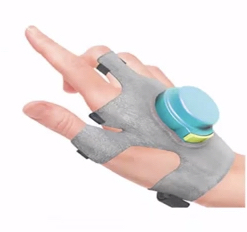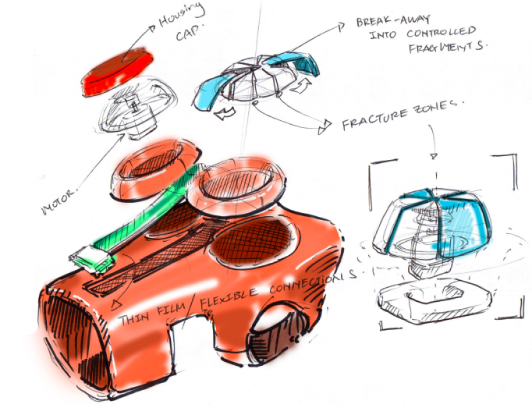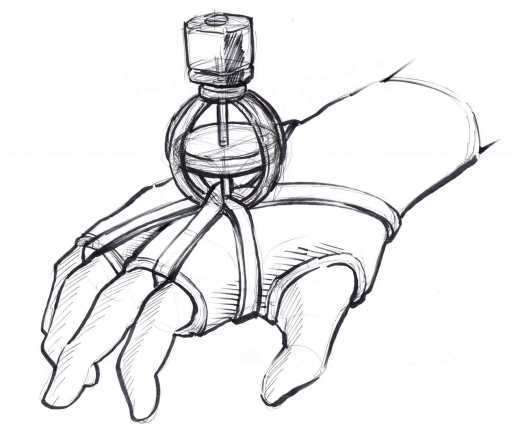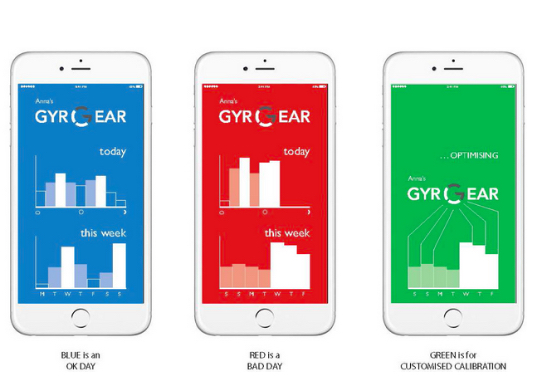Glove-like Device May Counter Parkinson-caused Hand Tremors

GyroGear, a medical device invention and development company currently based at Imperial College London, is developing an assistive device for Parkinson’s disease patients called the GyroGlove that is intended to stabilize and improve hand movement.
GyroGlove development is the current central focus of the GyroGear group,whose development team of engineers, designers and medics — students and graduates from Imperial College London —is backed by professionals ranging from experts in musculoskeletal biodynamics to senior engineering professors, and from to clinicians and serial entrepreneurs. Based on a concept inspired by aerospace technology, GyroGlove attaches spinning discs (gyroscopes) to the hand, which stabilizes and dampens hand tremors by resisting the wearer’s involuntary movements.
The project won the inaugural F Factor prize — an award launched by the Founders Forum and X Factor judge Simon Cowell, who announced the award at a June 2015 ceremony in London by saying, “How these young people think of this stuff I just don’t know? GyroGlove really impressed me as it actually has the potential to be a medical breakthrough.” The award was establish to promote and support technological discoveries by young entrepreneurs.
Gyrogear engineers, Paul de Panisse Passis and Tiarvando Lasiman, successfully pitched the GyroGlove to the panel of judges, and the entire £10,000 prize was applied to the glove’s development. GyroGear had also reached the final stage of the OneStart competition in 2014, the world’s largest life sciences and healthcare startup accelerator program focused on cultivating early stage entrepreneurship and innovation, with participation limited to applicants age 35 or younger.
Gyroscopes are spinning discs with a strong orientation to remain upright, thus conserving angular momentum and instantaneously and proportionally countering any input of force. The development team says they investigated elastic bands, weights, springs, magnetorheological dampers, hydraulics, soft robotics and more, but nothing cames close to the balance of responsiveness, simplicity, and reliability inherent in gyroscopes.

Image courtesy of Parkinson’s Life
The GyroGear story began two years ago, when the group’s founder, Joon Faii Ong, was a 24-year-old medical trainee and member of a team caring for a 103-year-old woman in a London hospital.
The team was stumped by the woman’s significant weight loss and increasing frailty. Could it be an undiagnosed malignancy, systemic disease, or a hitherto unknown condition?
Dr. Ong discovered the answer by happening to observe the patient at lunch, and watching as tremors resulted in most of her soup spilling onto her bedcovers and hospital gown. Querying the duty nurses, she was told: “Well, she’s a hundred and three, forgets you in five minutes, has those really bad shakes, and her medications have stopped working. There’s nothing we can do.”
 Dr. Ong, not being one to take no for an answer, founded the GyroGear group, and is now lead inventor of the patent-pending GyroGlove, a small and lightweight stability device that fits on the back of the hand.
Dr. Ong, not being one to take no for an answer, founded the GyroGear group, and is now lead inventor of the patent-pending GyroGlove, a small and lightweight stability device that fits on the back of the hand.
The GyroGlove developers say wearing the device feels like one’s hand is “moving in thick treacle” (British for molasses), allowing for smooth motion while resisting fine tremors. It is designed to assist in activities like writing, eating, making coffee, and much more. They note that early stage testing — conducted on a rig calibrated to a severe hand tremor — has demonstrated a more than 80 percent reduction in tremors.
A companion GyroGlove smartphone app tracks the tremors, enabling wearers to keep their doctors and others informed of their progress.
The GyroGear team adds that GyroGlove was developed in close contact with end users from day one, and that it came as a huge surprise to learn just how difficult it is for Parkinson’s patients to optimally manage their medications. The patients made it clear that only one of the 8,760 hours each year was spent with doctors, despite their medications’ significant side effects. For this reason, the developers seek to track tremors each time the GyroGlove is used, providing quantifiable data that will better inform users, their family and their doctors.
No release date for GyroGlove has been announced, but a U.K. launch is reportedly anticipated before September 2016. The glove is expected to cost between £400 to £600 ($550 to $850).
An Aban Gear video about GyroGlove can be viewed at www.youtube.com/watch?v=gFzHYU3aVAY
More information is also available at the company website, gyrogear.co
Sources:
GyroGear
Aban Gear








